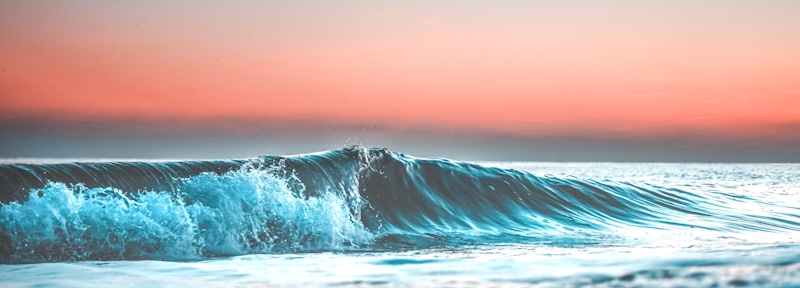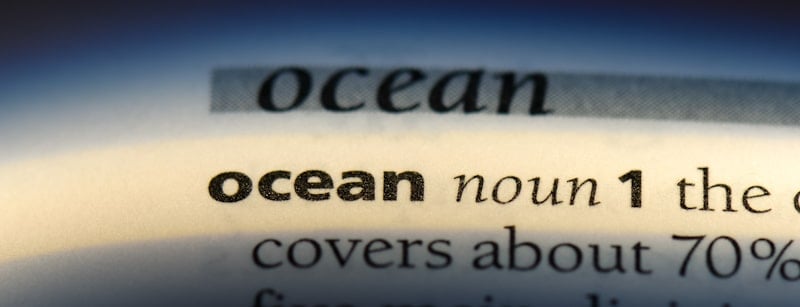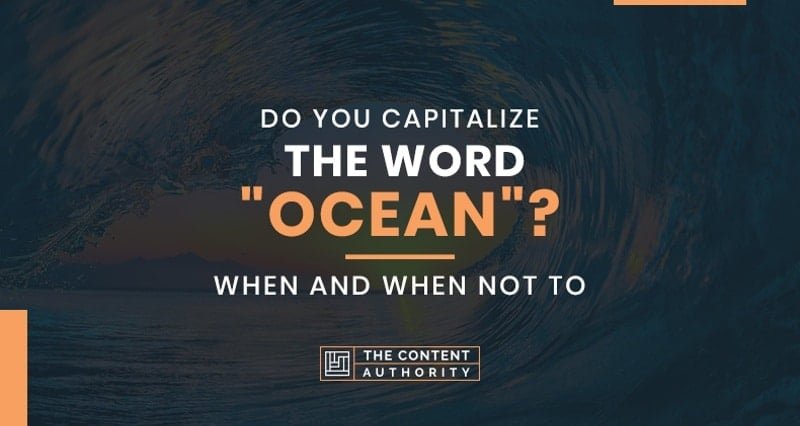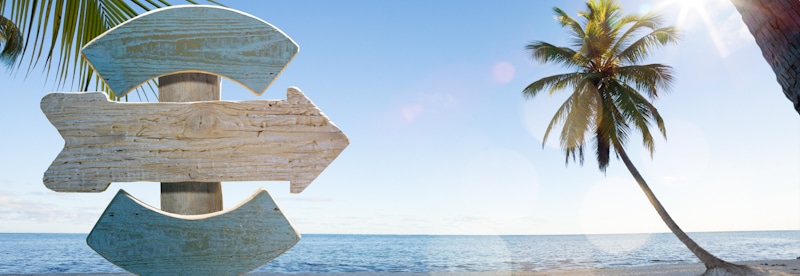General nouns are not capitalized, and proper nouns are always capitalized. However, there can be exceptions to this rule – or, in other words, general names could also be capitalized in certain instances. This is usually the case when the noun is part of a proper name or is positioned at the beginning of a sentence.
The word “ocean” gets capitalized if it’s part of a proper noun, such as the Pacific Ocean or the Atlantic Ocean. If it, however, is used as a single word, it is written in lowercase. The noun “ocean” is a common noun because it doesn’t denote a specific ocean but any of the various oceans.

The word “ocean” is an easy noun to understand as far as its capitalization rules go. However, there still are possibilities of getting the capitalization wrong. Keep reading to learn everything you should know about when and when not to capitalize the word so that you steer clear of silly errors in your writings.
What is the Ocean?
An ocean is a massive saltwater body constituting around 71 percent of Earth’s surface. There are primarily four oceans, based on their geographies: the Pacific Ocean, the Atlantic Ocean, the Indian Ocean, and the Arctic Ocean. Besides these four oceans, another ocean basin has been recently added to the list, called the Southern Ocean. This new ocean is based on the seas surrounding Antarctica.
Though Earth has five oceans, the different oceans can be considered as one global ocean. Moreover, not all the 71 percent of the oceans are visible to the naked human eye. In fact, just 20 percent of the oceans can be seen by humans. In other words, the remaining 80 percent is located at yet-to-be explored depths. Oceans are such a mystery that humans know a lot more about the planet Mars and moon than they know about their oceans.
Difference Between an Ocean and a Sea
An ocean and sea are two different types of water bodies. Many people, however, use the two terms interchangeably.
As far as the differences between an ocean and a sea are concerned, an ocean is bigger and not enclosed by land partially, unlike a sea. A sea is also typically situated where the sea and land meet. However, there could be exceptions to this. For instance, the Sargasso Sea is defined by ocean currents only.
Rules for Capitalizing the Word “Ocean”
As mentioned above, the word “ocean” is used as a general noun. When the noun is used to denote specific geographies, however, it is capitalized. For example:
- The Arctic Ocean is the Earth’s smallest ocean.
When the noun “ocean” is used as a proper noun in a sentence and then immediately used in a follow-up sentence as a general noun, it still is written in lowercase. For example:
- Being the second-largest ocean basin in the world, the Atlantic Ocean is massive. The ocean covers around 20 percent of Earth’s surface and approximately 29 percent of the planet’s water surface area.
If the word “ocean” starts a sentence, it’s capitalized to keep in line with perhaps the easiest and extremely straightforward capitalization rule. There are pretty much zero exceptions or complications in this regard. For example:
- Oceans are the most significant contributors to the Earth’s water mass.
Capitalizing Articles Before “Ocean”
Articles are words defining a noun or giving nouns a certain identity. There are three articles: “the”, “a”, and “an”. “The” is considered as a “definite” article, and “a” and “an” are indefinite articles.
The definite article is called so because it is specific or limits a noun’s meaning to a particular thing. The other two articles are not as direct.
The definite article could be used with uncountable, plural, or singular nouns. For example:
- It is called the Atlantic Ocean.
- The ocean is the biggest of all the five oceans.
- The oceans constitute a huge portion of the Earth’s water bodies.
 Irrespective of whether you use these articles with a general noun, such as “ocean”, or a proper ocean name in a sentence or even a headline or title, they are never capitalized. For example:
Irrespective of whether you use these articles with a general noun, such as “ocean”, or a proper ocean name in a sentence or even a headline or title, they are never capitalized. For example:
- The Chi Tandui flows from the south toward the Indian Ocean.
- The most common cause for the interruption is the ocean bed’s seismic changes.
If the article, however, is at the beginning of the sentence, it is capitalized as per the rules. For example:
- The Atlantic Ocean’s tides are incredibly complex.
- The Southern Ocean’s tidal wave, which uninterruptedly sweeps around the globe, creates another wave between South America and Africa.
There is another exception to this “article capitalization” rule. In other words, if the article is part of the official name, it is capitalized. For example:
- They visited The Hague.
- She watched the reruns of The Untouchables all afternoon.
- I have not yet read The Treasures of Queen.
- The United Nations played a significant role in stabilizing Haiti after the devastating 2010 earthquake.
Articles can also be omitted in sentences. Such skipping of articles is called “omission of articles”. In such scenarios, the article is not present but implied. The implied article is at times referred to as a “zero article”. Quite often, the article is overlooked before names or nouns that denote abstract ideas or events. For example:
- Let’s go for lunch together.
- Creativity is an invaluable quality for kids to have.
In the above two sentences, the nouns “lunch” and “creativity” do not have articles before them. If they were written with articles, they would be incorrect and sound awkward too. For example:
- Let’s go for the lunch together.
- The creativity is an invaluable quality for kids to have.
As far as skipping the article in front of “ocean” or “oceans” is considered, the omission does not happen since the noun “ocean” is not abstract. For example:
- Mark faced the ocean. (Correct)
- Mark faced ocean. (Incorrect)
- She was gorgeous, with chocolate-brown skin and eyes reminiscent of the blueness of an ocean. (Correct)
- She was gorgeous, with chocolate-brown skin and eyes reminiscent of the blueness of ocean. (Incorrect)
At times, however, the noun “ocean” may not be immediately preceded by an article – an adjective could take its place instead. For example:
- I believe the great ocean will embrace the new cruise ship and allow it to sail over its waves peacefully.
- The frigid ocean breeze made her dress sway as it had life.
Example Sentences with the Word “Ocean”
The following is a list of sentences with the word “ocean”. In some cases, they are part of a name, and in certain other sentences, the noun is employed as a general noun. The capitalization rules have been applied accordingly.
- The Indian Ocean has more depth compared to the Atlantic Ocean.
- They were keen to swim in the ocean; the water, however, was extremely cold.
- Which is the biggest ocean?
- She was breathing the ocean air.
- The ocean’s sight, scent, and sound helped her relax.
- The ocean’s soothing sounds greeted him.
- The roaring ocean’s sound filled the chamber.
- Almost frozen by the cold wind of the ocean, Justine pressed herself against Tim’s warm body.
- She smelled of blood and ocean water.
- She was gazing at the ocean – her diminutive form still and tense.
- The St. Lawrence river and the Atlantic Ocean have no mountains between them.
- The ocean was a bit too dark to witness.
- Watching the sun sinking into the ocean, she knew it was just a few minutes before Tom would eventually give in.
- In the distance, he saw the ocean blue meeting the horizon.
- The ocean was quite cold, and the wet sand crushed between his toe.
- “A rising tide lifts all boats” is an idiom about the ocean’s tides.
- The breeze of the ocean cooled her back, with her heartbeat in perfect synchronization to the tide’s movement.
- Once their ship started to sail in the great Indian Ocean, it was already 800 miles away from the coast.
- She devoted several years to the project that organized the fur trade between the Pacific Ocean and the Great Lakes.
- The entrance to the place was in the west, on the Ocean’s borders, in the Cimmerians’ mythical land.
- I will help you access the Indian Ocean Sanctuary.
- She was eager to sail across the ocean.
- Being from the heartland of America, Kathleen found the ocean enchanting.
- The Atlantic Ocean is an S-shaped water belt between Africa and Europe’s west coasts and the east coasts of South and North America.
- Compared to other oceans, the Atlantic Ocean has fewer islands.
- The experience procured during the earlier periods of ocean telegraphy is invaluable.
- She was feeling cold but was pumped to get a good glimpse of the ocean.
- The sensors can accurately track the ocean water’s contents.
Conclusion
To conclude, the capitalization rule for the noun “ocean” is relatively easy and straightforward. If it’s part of a name or proper noun, capitalize the term. If it’s not or is used as a standalone word, write it in lowercase.
The general noun “ocean”, however, should be capitalized only if it’s at the start of a sentence or part of a headline or title. But if the headline itself is in sentence case, “ocean” will be in lowercase too – except for if it’s a proper noun, as in “the Pacific Ocean”.
Shawn Manaher is the founder and CEO of The Content Authority. He’s one part content manager, one part writing ninja organizer, and two parts leader of top content creators. You don’t even want to know what he calls pancakes.


